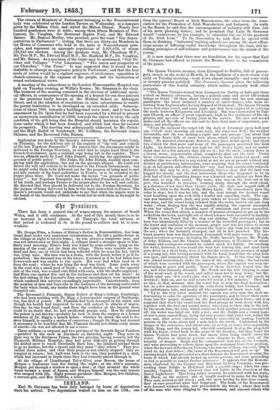4t Vrouiurto.
There has been a general rise of wages among the miners of South Wales, and it still continues. At the end of this month there is to be an increase in several places. At Nantyglo the total advance at that period is reckoned at 5s. in the pound to colliers and 4s. to iron- workers.
Mr. George Elms, a farmer of Bishop's Sutton in Somersetshire, has been found dead under very suspicious circumstances. He left a public-house in the village at night to return home ; he was always a temperate man, and was not intoxicated on that night. A villager heard a stranger speak to him. Early next morning, Elms's body was found by some colliers, lying on the margin of the road, not far from the village. There were wounds on the head and face, one of which had been inflicted while he wore his hat, which was lying near. His face was in a drain, with the hands before it as if for protection : the deceased was on his knees ; it seemed as if he had fallen face downwards and was unable to rise again. His coat had white mud on it from the road ; where he was lying the mud was black. Some yards away in the road was a small pool of blood ; a short distance off, on the opposite side of the road, was a small cart filled with coals, with the shafts supported : had Elms run against this cart in the darkness and thus cut his head ? At the first sitting of the Coroner's Jury several circumstances were mentioned which rendered this solution exceedingly improbable. Unfortunately, from the number of men and boys who in the darkness of the morning surrounded the body when found, any marks there might have been on the ground were trampled out.
The Reverend J. Flamank, Senior Fellow of ring's College, Cambridge, who had been residing with Dr. Rigg, a homeopathic surgeon of Northamp- ton, has died of poison. Mr. Flamank had been deranged in his mind, and though his health had improved he was still subject to attacks of mania. One day he was found dead,' and from the evidence at the inquest there could be no doubt that he had swallowed prussic acid. How he obtained the poison is not known—probably he took it from the surgery, at a former residence of Dr. Rigg'a, a month before : whether he drank the acid to de- stroy himself, is equally a matter of conjecture ; though Dr. Rigg had deemed it necessary to be watchful that Mr. Flamank should not obtain ready means of suicide—he was not allowed to use a razor.
Three soldiers—a corporal and two privates of the Seventh Royal Fusiliers —perished in the snow on Dartmoor on Saturday night. They were on their way to the Dartmoor Prison, the two privates having recently left the Plymouth Military Hospital; they had great difficulty in getting through the drifted snow to reach Dourlands Barn Inn ; the landlord advised them to go no farther, but the corporal said they must "obey orders." They pro- ceeded three miles, and then their progress was utterly stopped : they at.- tempted to return ; but, half-way back to the inn, they perished in a drift, which had increased in depth since they had formerly passed through it.
At the village of Llanfihangel Tal-y-Glyn, near Brecon, the house of Morgan a tradesman took fire during the night ; at his wife's entreaty, Morgan got through a window to open a door; at that moment the whole house became a mass of flames, and Morgan himself was the only inmate who escaped with life. Eight persons perished—Mrs. Morgan, five children, a servant-girl, and Mrs. Griffiths, a widow.


























 Previous page
Previous page